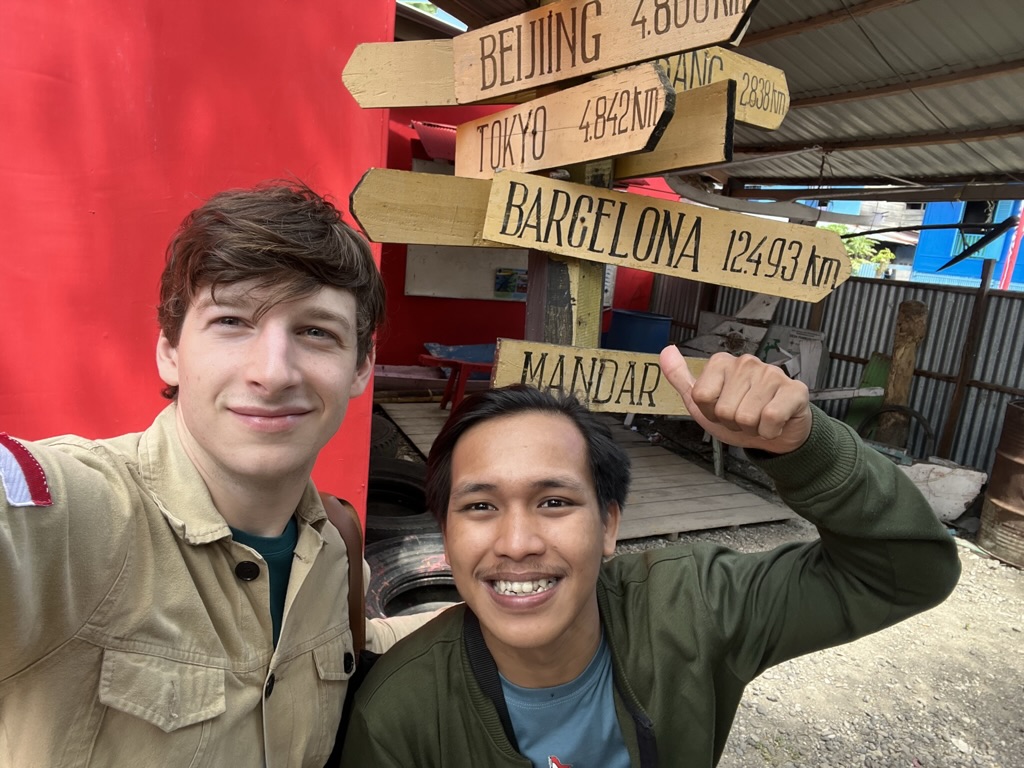Advising Native-Speaker Linguists
 A central priority of my work involves the training of native-speaker linguists. The two speakers that I have worked with have both become interested in linguistics and moved forward in the field. My first consultant, Nabila Haruna, became the government Language Ambassador of South and West Sulawesi in 2021. My primary consultant, Jupri Talib, has begun to pursue a master's degree in linguistics at Hasanuddin University. In the future, he plans to continue on in linguistics and pursue a PhD there as well. Jupri and I have given talks on our work together in two places: the AIFIS-MSU Conference on Indonesian Studies and the National Agency for Research and Innovation.
A central priority of my work involves the training of native-speaker linguists. The two speakers that I have worked with have both become interested in linguistics and moved forward in the field. My first consultant, Nabila Haruna, became the government Language Ambassador of South and West Sulawesi in 2021. My primary consultant, Jupri Talib, has begun to pursue a master's degree in linguistics at Hasanuddin University. In the future, he plans to continue on in linguistics and pursue a PhD there as well. Jupri and I have given talks on our work together in two places: the AIFIS-MSU Conference on Indonesian Studies and the National Agency for Research and Innovation.
In 2023, Jupri received an offer to become a professor in linguistics at the University of West Sulawesi, pending the completion of his degree. Here is a biography that he wrote in 2022, before grad school, in translation:
"My name is Jupri Talib. I've just finished an undergrad degree in English literature at Kanjuruhan Teacher's College, Malang, with a thesis on the metrical structure of the Kalinda'da' poetry of West Sulawesi. I've found a real passion for linguistics, and I want to do research here in Indonesia in order to help preserve the traditions, literatures, and languages of Nusantara.
"I've been helping with research on the structure of Mandar with Dan since 2018. I feel really proud that there's a foreign researcher who wants to learn this language, and helping with this work has given me the opportunity to learn a lot about linguistics- from the basic structure of Mandar clauses to the theory of prosodic phonology, especially as applied to traditional Kalindaqdaq poetry. This opportunity has also made me realize that my language is really unique and full of special properties that have been preserved through the generations and must be maintained today. My hope is that with this research, other people will be able to easily learn about Mandar, and find a model for doing research on the regional languages that are spoken in every corner of Indonesia."
Petitioning for a Local Department
A related component of my work involves supporting the linguistics scene in West Sulawesi, where Mandar is spoken. There is currently no department of linguistics at the University of West Sulawesi, and all government-sponsored research on the languages of that province has been halted for external political reasons since 2004. In 2023, I was invited to the University of West Sulawesi by Sitti Sapia, a professor of linguistics, to give a talk on the value of linguistic research and support a petition to create a department.
Community Work
Working with Jupri and the local cultural authorities, I have tried to set up a public profile of a linguist that is sensible and useful to the Mandar community at large. Since my first visit to West Sulawesi in 2019, I have built connections with universities and cultural institutions, given invited speeches at traditional events, and appeared in several venues to speak about bilingualism, language maintenance, and the value of the language as it might be understood in the community and in circles of western academia.

To give a sense of this work, I've linked an episode of a local podcast where I appear below. This podcast is titled "What's so special about Mandar?", and it's an interview with Ridwan Alimuddin, an author and documentary filmmaker. The discussion focuses on the nature of my research, the reason that I am interested in Mandar, and the results of my research over the past four years. It first lays out a set of reasons why the language is special, from its vocabulary to its history to technical points about the grammar (the phoneme inventory; the phrasal phonology; the remarkable pattern of rightward movement). After that, it spells out a set of sociolinguistic challenges in West Sulawesi today and then turns to the reasons why a language might be threatened- and what might be done to slow its decline. The in-depth discussion occurs in Indonesian, but introduction and the first few minutes of the discussion are in Mandar.